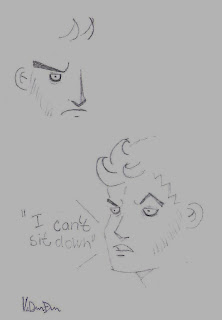Hi J
Absurd plays can seem like a total nonsense. However, they always hide something behind all their strangeness. Endgame is no exception. Lot of people complain that it is totally weird. Still, it contains lot of (hopefully meaningful) symbols. Here are few quotes that might help you to understand it more.
“Finished, it's finished, nearly finished, it must be nearly finished”
By Clov
This is the first line that is said in the play. What a paradox the play start with word finished. The name Endgame already hinds that something is going to end. What Clov mean by that? As you may already know (from previous blog articles) Clov plans to go and leave Hamm.
“Then there's no reason for it to change.”
By Hamm
Ham is the master of the room (the place where the whole play happens). As I mentioned earlier, one of the theme of Endgame and absurd plays in general is cycle. It might refers to everyday living that Hamm and others have to live together. Another theme can be “scare of the DEATH.” Our characters live in a weir room and the world outside seems post apocalyptic. The characters are actually waiting for dead and Hamm by saying “no reason for it to change” meant “I still don’t want to die.”
“Why this farce, day after day?”
By Nell
Nell is the only women in the whole play. She is wife of Nagg and Nagg really loves her. She said this quote after they failed to kiss each other. The line can mean more than being in miserable life. Actually, it point out, that Nell start to question. She as a only female character was able to think of something that complex. In other words “isn’t this ridiculous?” She also as the only character died in the play. This could be her reward after all, she as the only one realized that their life is Absurd.
“Don't say that.”(When Nell hind that everything is useless)
“Do you remember?”
“Do you want to go in?”
By Nagg
These quotes are all said by Nagg to Nell. These line are examples of how madly in love is Nagg with Nell. He is only character, that shows true emotions. The other characters are not showing much emotion including Hamm when his mother died. He also cry when he found out that Nell died. It is really sad because Nell and Nagg cannot touch each other, even though they live next to each other.
“Old endgame lost of old, play and lose and have done with losing.”
By Hamm
The word endgame (also name of the play) is term in chess that is use when the game is almost finished and only few figures remain. This quote summarize it all, in this case end that is near and which lead to losing. The characters in the play are in “destroyed world” and are probably only one who remains and



























